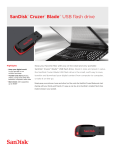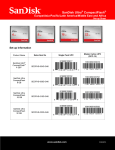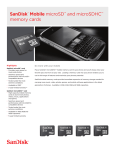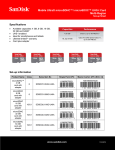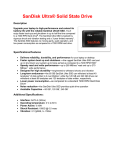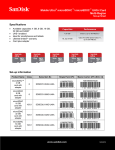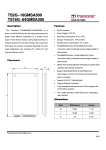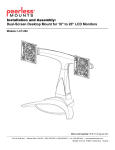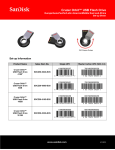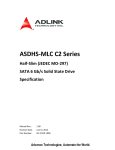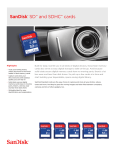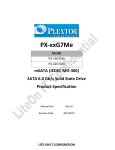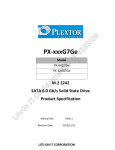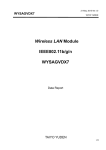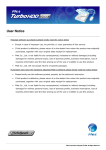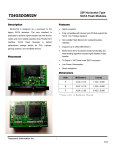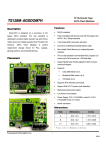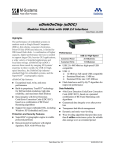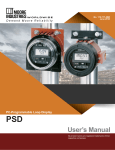Download Sandisk 80-36-03353 User's Manual
Transcript
SanDisk uSSD 5000 Product Manual SanDisk uSSD 5000 Product Manual Revision 1 October 08 SanDisk Corporation Corporate Headquarters • 601 McCarthy Blvd. • Milpitas, CA 95035 Phone (408) 801-1000 • Fax (408) 801-8657 www.sandisk.com © 2008 SanDisk® Corporation 1 October 2008, Document no. 80-36-03353 SanDisk uSSD 5000 Product Manual Table of Contents 1. Introduction ........................................................................................ 3 1.1 General Description ....................................................................... 3 1.1.1 1.1.2 1.1.3 1.1.4 Applications ............................................................... 3 Rugged and Reliable .................................................... 3 High Performance ....................................................... 3 Cost Effective ............................................................. 3 1.2 Features ...................................................................................... 4 1.3 Scope ......................................................................................... 5 1.3.1 1.3.2 1.3.3 1.3.4 Technology Independence ............................................ 5 Defect and Error Management ...................................... 5 Wear-leveling ............................................................. 5 Bad Block Management ................................................ 5 2. Product Specifications ......................................................................... 6 2.1 Formatted Capacities ..................................................................... 6 2.2 System Environmental Specifications ............................................... 6 2.3 System Power Requirements .......................................................... 7 2.4 Voltage Ramp Down Recommendation ............................................. 7 2.5 System Performance ..................................................................... 8 2.6 System Reliability ......................................................................... 9 2.7 Endurance ..................................................................................10 2.8 Electrical Interface .......................................................................10 2.6.1 MTTF ......................................................................... 9 2.8.1 uSSD Connector ....................................................... 10 2.8.2 Electrical Specifications .............................................. 11 2.9 Physical Specifications ..................................................................12 2.9.1 Standard Configuration .............................................. 12 2.9.2 Low Profile Configuration ........................................... 13 2.9.3 uSSD-to-USB Adapter................................................ 13 2.10 Product Markings and Traceability ..................................................14 2.11 OS Support .................................................................................15 2.12 Regulatory Compliance .................................................................15 Ordering Information ............................................................................. 16 Disclaimer of Liability ............................................................................. 17 © 2008 SanDisk® Corporation i October 2008, Document no. 80-36-03353 SanDisk uSSD 5000 Product Manual List of Tables Table 1: Formatted Capacities ................................................................. 6 Table 2: Environmental Specifications ...................................................... 6 Table 3: Power Requirements .................................................................. 7 Table 4: Performance ............................................................................. 8 Table 5: Reliability ................................................................................. 9 Table 6: uSSD MTTF .............................................................................. 9 Table 7: Host Interface 2x5 On-Board Header ......................................... 10 Table 8: Absolute Maximum Ratings ....................................................... 11 Table 10: DC Characteristics for Full-Speed Operation (TA = 25°C) ............ 11 Table 11: DC Characteristics for High-Speed Operation (TA = 25°C) ........... 11 Table 11: Physical Dimensions .............................................................. 12 Table 12: OS Support .......................................................................... 15 Table 13: Ordering Information ............................................................. 16 © 2008 SanDisk® Corporation ii October 2008, Document no. 80-36-03353 SanDisk uSSD 5000 1. Introduction 1.1 General Description Product Manual The SanDisk uSSD takes the benefits of flash storage to new markets with low-capacity storage requirements, most notably the low-cost PC (LCPC). Rugged and reliable, it is a fraction of the size and cost of a hard disk drive (HDD) in the 1 to 16 GB range. SanDisk adds high performance to the uSSD offering, based on an advanced controller that exemplifies the company’s years of USB expertise. 1.1.1 Applications The SanDisk uSSD offers a no-compromise flash-based storage solution for: LCPCs that need rugged reliability and require up to 4 GB. The uSSD can meet these requirements more cost-effectively than an HDD Desktops that support Microsoft® Vista and can benefit from enabling ReadyBoost® up to 4GB. Point of sale (POS) stations, where the uSSD replaces the HDD Blade servers, where the uSSD is ideal to store critical backup files and provide boot functionality 1.1.2 Rugged and Reliable Unlike the HDD, the SanDisk uSSD has no moving parts. It keeps working in challenging environments such as classrooms, kiosks and on space-restricted server floors. The patented flash management technology brings top data integrity to the uSSD, even during power losses. Dynamic bad block management, dynamic and static wear-leveling, and robust error detection and correction code (EDC/ECC) ensure data reliability. 1.1.3 High Performance The uSSD achieves a sustained read speed as high as 30 MB/sec and a sustained write speed of up to 20 MB/sec with single-level cell (SLC) technology. 1.1.4 Cost Effective There is no need to pay for more capacity than you require. The uSSD lets you purchase just the right amount of storage, packed inside a memory device that’s 25% smaller than a 1.8” HDD. It offers you the choice of single-level cell (SLC) flash technology or the more cost-effective multi-level cell (MLC) technology. © 2008 SanDisk® Corporation 3 October 2008, Document no. 80-36-03353 SanDisk uSSD 5000 1.2 Product Manual Features The SanDisk uSSD 5000 provides the following system features: Non-volatile storage (no battery required) USB 2.0 interface, certified by the USB organization (http://www.usb.org/home) Complies with Microsoft Vista ReadyBoost® requirements Up to 16 GB of mass storage based on SanDisk’s reliable flash technology SLC flash and MLC flash-based configurations Fixed configuration (not removable) Low power consumption High performance: Sustained Read and write speed of up to 30 MB/sec for reading, 20 MB/sec for writing (SLC configuration) Rugged Lightweight Silent Standard and low profile Advanced error detection and error correction algorithms Advanced wear-leveling algorithms Guaranteed data integrity even after power loss MTTF > 8,000,000 hours Multiple OS support Warranty: 3 years © 2008 SanDisk® Corporation 4 October 2008, Document no. 80-36-03353 SanDisk uSSD 5000 1.3 Product Manual Scope This document describes the key features and specifications of the uSSD 5000, as well as the information required to interface this product to a host system. 1.3.1 Technology Independence To write or read a sector (or multiple sectors), the host computer software simply issues a Read or Write command to the module. This command contains the address and the number of sectors to write/read. The host software then waits for the command to be completed. The host software does not participate in the details of how the flash memory is erased, programmed or read. This is extremely important as flash devices are expected to increase in complexity in the future. Because the uSSD 5000 uses an intelligent on-board controller, the host system software will not need to be changed as new flash memory evolves. As such, systems that support uSSD 5000 now will be able to access future SanDisk Modules built with new flash technology without any need to update or change the host software. 1.3.2 Defect and Error Management The uSSD 5000 contains a sophisticated defect and error management system. If necessary, the Module will rewrite data from a defective sector to a good sector. This is completely transparent to the host and does not consume any user data space. The uSSD 5000 soft error rate specification is much better than the magnetic disk drive specification. In the extremely rare case that a read error does occur, the uSSD 5000 has innovative algorithms to recover the data by using hardware on-the-fly Error Detection Code/Error Correction Code (EDC/ECC), based on a BCH algorithm. These defect and error management systems, coupled with solid state construction, give the SanDisk uSSD 5000 unparalleled reliability. 1.3.3 Wear-leveling Wear-leveling is an inherent part of the erase-pooling functionality of the SanDisk uSSD 5000, using NAND memory. Advanced features of dynamic and static wear-leveling and automatic block management are used to ensure high data reliability and maximize flash life expectancy. 1.3.4 Bad Block Management Bad blocks are occasionally created during the lifecycle of a flash component, in a phenomenon called dynamic bad block accumulation. These bad blocks must be dynamically marked and replaced to prevent read/write failures. When a bad block is detected, the embedded bad block mapping algorithm maps out the block, which is then no longer used for storage. © 2008 SanDisk® Corporation 5 October 2008, Document no. 80-36-03353 SanDisk uSSD 5000 Product Manual Product Specifications 2. For all the following specifications, unless otherwise stated, values are defined at ambient temperature and nominal supply voltage. 2.1 Formatted Capacities Table 1 shows the formatted capacities for the uSSD 5000: Table 1: Formatted Capacities Capacity [GB] Capacity (formatted in bytes) Sectors/Module (Max. LBA+1) No. of Heads No. of Sectors/ Track No. of Cylinders SLC Configurations 1 1,002,438,656 1,957,537 16 63 1,942 2 2,048,900,608 4,001,760 16 63 3,969 4 4,110,188,032 8,027,712 16 63 7,963 8 8,220,645,376 16,055,949 16 63 15,928 MLC Configurations 2.2 2 2,048,900,608 4,001,760 16 63 3,969 4 4,110,188,032 8,027,712 16 63 7,963 8 8,220,645,376 16,055,949 16 63 15,928 16 16,441,481,216 32,112,269 16 63 31,857 System Environmental Specifications Table 2 lists the environmental specifications, including temperature, noise level, vibration, shock and altitude. Table 2: Environmental Specifications Specification Parameters Temperature Operating (Commercial): 0° C to 70° C Storage temp without user data retention: -40° C to 85° C Storage temp with user data retention: 0° C to 70° C Noise Level 0 dB Vibration Operating: 2.17gRMS (20Hz to 2000Hz, 3 vibration axes, 60 min) Non operating: 3.08 gRMS (20 Hz to 2000 Hz) Shock Operating: 50 g, 11 msec duration, half sine Non operating: 1,500 g, 0.5 msec duration, half sine Altitude (relative to sea level) 80,000 ft. maximum ESD Contact discharge: Up to 4 KV (enclosed in a host) Air discharge: Up to 8 KV (enclosed in a host) Flammability ratings for major components PCB: 888-1 94V0 HK ASIC Packaging materials: 94V0 Flash packaging materials: 94V0 Labels: CM-100-SM, CM-200-WS © 2008 SanDisk® Corporation 6 October 2008, Document no. 80-36-03353 SanDisk uSSD 5000 2.3 Product Manual System Power Requirements All values quoted in Table 3: Power Requirements are typical at 25° C and nominal supply voltage unless otherwise stated. Table 3: Power Requirements Power Mode Products 5V +/- 10% IDD 5V +/- 10% IDD SLC 1GB, 2GB, 4GB, 8GB MLC 4GB, 8GB, 16GB MLC 2GB 2.4 Standby 2.5 mA 2.5 mA Operating HS Read 150 mA 200 mA Operating HS Write 150 mA 200 mA Idle HS 100 mA 100 mA Voltage Ramp Down Recommendation Vflash_protect Vflash_min Tpoff Memory Min Typ Max Unit Binary 1 - - ms MLC 3 - - ms Vflash_protect Any 4.27 4.38 4.49 V Vflash_min Any - - 2.7 V Tpoff © 2008 SanDisk® Corporation 7 October 2008, Document no. 80-36-03353 SanDisk uSSD 5000 2.5 Product Manual System Performance Table 4 lists the performance parameters of the SLC and MLC flash-based configurations: Table 4: Performance Specification Parameters Maximum performance for 1 GB, 2 GB, 4GB and 8GB (SLC flash configurations) Sequential Read 30 MB/sec Sequential Write 20 MB/sec Random Read 30 MB/sec Random Write 6 MB/sec Maximum performance for 2 GB (MLC configuration) Sequential Read 27 MB/sec Sequential Write 6 MB/sec Random Read 25 MB/sec Random Write 2.2 MB/sec Maximum performance for 4 GB, 8 GB and 16GB (MLC configuration) Sequential Read 27 MB/sec Sequential Write 12 MB/sec Random Read 25 MB/sec Random Write 3.5 MB/sec Host compatibility USB 2.0 Up to 60 MB/sec Note: Random read and write were measured on Windows 2000 with HDBench on a 100MB file transfer © 2008 SanDisk® Corporation 8 October 2008, Document no. 80-36-03353 SanDisk uSSD 5000 2.6 Product Manual System Reliability Table 5: Reliability Specification Parameters Data Reliability Error detection / error correction based on BCH algorithm Data integrity after power loss Data is guaranteed after power loss Bad blocks Transparent bad block management Wear-leveling Dynamic and Static Wear-leveling 2.6.1 MTTF The reliability figure of merit most often used for electronic equipment is Mean Time To Failure (MTTF). SanDisk estimates MTTF using a prediction methodology based on reliability data for the individual components in SanDisk products. Component data comes from several sources: device life tests, failure analysis of earlier equipment, device physics, and field returns. SanDisk uses following methods to predict reliability: Telcordia Special Report SR-332, Reliability Prediction Procedure for Electronic Equipment (RPP). British Telecom Industry HRD5, Handbook of Reliability Data for Electronic Components used in Telecommunication System. Table 6 summarizes the MTTF prediction results for various uSSD configurations. The analysis was performed using a RAM Commander™ failure rate prediction. Failure Rate: The total number of failures within an item population, divided by the total number of life units expended by that population, during a particular measurement interval under stated condition. Mean Time To Failures (MTTF): A basic measure of reliability for repairable items: The mean number of life units during which all parts of the item perform within their specified limits, during a particular measurement interval under stated conditions. Table 6: uSSD MTTF Product Condition MTTF (Hours) 1GB, 2GB, 4GB Telcordia SR-332, GB, 25°C 10M 8GB, 16GB Telcordia SR-332, GB, 25°C 8M © 2008 SanDisk® Corporation 9 October 2008, Document no. 80-36-03353 SanDisk uSSD 5000 2.7 Product Manual Endurance The uSSD5000 SLC flash-based configurations have guaranteed endurance of 3 years for all capacities (1, 2, 4 and 8GB). The uSSD5000 MLC flash-based configurations have guaranteed endurance of 3 years as follows: BAPCO Student profile – uSSD MLC 8GB and up. BAPCO Personal profile – uSSD MLC 4GB and up. 2.8 Electrical Interface Table 7 lists the host interface on-board header pins and signals. Table 7: Host Interface 2x5 On-Board Header Pin Signal Pin Signal 1 +5VDC 2 +5VDC 3 USB1 Data(-) 4 USB2 Data(-) 5 USB1 Data(+) 6 USB2 Data(+) 7 GND 8 GND 9 Key (no pin) 10 NC 2.8.1 uSSD Connector Figure 1 illustrates the uSSD 2x5 device interface connector: Figure 1: uSSD 2x5 Connector Pinout © 2008 SanDisk® Corporation 10 October 2008, Document no. 80-36-03353 SanDisk uSSD 5000 Product Manual 2.8.2 Electrical Specifications Absolute Maximum Ratings 2.8.2.1 Table 8: Absolute Maximum Ratings Parameter Symbol Min Max Unit TA 0 70 °C Power Supply Voltage Relative to Ground Vbus 0 5.5 V Voltage level on D+ / D- Relative to Ground 3 Vdata -0.3 5.8 V Ambient Operating Temperature Range (Commercial) 2.8.2.2 DC Characteristics Table 9: DC Characteristics for Full-Speed Operation (TA = 25°C) Parameter - USB Signals Symbol Min Typ Max Unit Supply Voltage: VBUS 4.5 5.0 5.5 V Supply Current (RMS): Operating Suspend Icc Iccs - 120 1.6 150 2.5 mA mA - - 150 mA Max Current Consumption (Peak Value) Input Levels USB Signals (D+, D-): Low High VIL VIH 2.0 - 0.8 - V V Output Voltage USB Signals (D+, D-): Low High VOL VOH 0.0 2.8 - 0.3 3.6 V V 1.3 - 2.0 V Output Signal Crossover Voltage USB Signals (D+, D-) VCRS Table 10: DC Characteristics for High-Speed Operation (TA = 25°C) Parameter - USB Signals Supply Voltage: Supply Current (RMS) Operating Suspend Symbol Min Typ Max Unit VBUS 4.5 5.0 5.5 V Icc Iccs - 120 1.6 150 2.5 mA mA - - 150 mA Max Current Consumption (Peak Value) Input Levels USB Signals (D+): Low High VIL VIH -10 360 - 10 440 mV mV Input Levels USB Signals ( D-): Low High VIL VIH 360 -10 - 440 10 mV mV Output Voltage USB Signals (D+, D-): Low High VOL VOH -10 360 10 440 mV mV © 2008 SanDisk® Corporation 11 October 2008, Document no. 80-36-03353 SanDisk uSSD 5000 2.9 Product Manual Physical Specifications SanDisk offers the uSSD 5000 in 2 form factors: Standard profile Low profile Table 11 and Figure 2, Figure 3 and Figure 5 list the physical specifications and dimensions of the uSSD 5000. Table 11: Physical Dimensions Dimension Parameters Weight 4.9g Length Standard and Low Profile: 37.80 ± 0.25 mm Width Standard and Low Profile:26.65 ± 0.25 mm Thickness Standard profile: 10.60 ± 0.25 mm Low Profile: 6.58 ± 0.25 mm 2.9.1 Standard Configuration Figure 2: uSSD Standard Version, Side View © 2008 SanDisk® Corporation 12 October 2008, Document no. 80-36-03353 SanDisk uSSD 5000 Product Manual Figure 3: uSSD Standard Version, Bottom View 2.9.2 Low Profile Configuration Figure 4: uSSD 2x5 Low Profile Version, Side View Figure 5: uSSD 2x5 Low Profile Version, Bottom View 2.9.3 uSSD-to-USB Adapter An adapter is available to assist customers in evaluating the uSSD 5000. The adapter enables inserting the uSSD 5000 in an external desktop or laptop USB port. The adaptor is available at its leaded format for purchasing and its SKU is SDADP-UC-001 Figure 6: uSSD External USB Adapter © 2008 SanDisk® Corporation 13 October 2008, Document no. 80-36-03353 SanDisk uSSD 5000 Product Manual 2.10 Product Markings and Traceability SKU# Ordering Info See Appendix A for further options SDUS5AB-001G - SD SanDisk US5 uSSD 5000 A standard profile with LED /E low Profile with LED/ /F low Profile with external LED B Binary (SLC)/J MLC YYWWDMNNNNN –YY year WW week D Month day M Subcontractor code NNNNN Running serial number Firmware# - according to Bill of Material 54-90-XXXXX-CCCC Internal SanDisk subunit Number © 2008 SanDisk® Corporation 14 October 2008, Document no. 80-36-03353 SanDisk uSSD 5000 Product Manual 2.11 OS Support The uSSD 5000 is supported under the operating systems listed in Table 12. In the standard boot and storage modes, the uSSD 5000 is recognized as a fixed disk in the system. The system can also boot from the uSSD 5000, eliminating the need for additional components. Software packages for the supported operating systems can be downloaded from the SanDisk website, along with the relevant documentation. Table 12: OS Support Operating System Version Support Service Pack 2 SanDisk driver Windows XP Embedded SP2 FP 2008 Native in the OS Windows Vista (Storage and ReadyBoost support) 32 bit + 64 bit Native in the OS Windows Embedded for Point of Service (WEPOS) Service Pack 2 SanDisk driver Windows XP Pro Windows Server 2003 SanDisk driver Windows CE Linux 5.0 and 6.0 Native in the OS Kernel 2.6.XX Native in the OS DOS Native in the OS 2.12 Regulatory Compliance The uSSD 5000 complies with the following: USB Organization certification RoHS (6 Materials) Chinese RoHS FCC Class B for Information Technology [MIC, BMSI, VCCI] CE EN 55022/55024 UL 60-950-1 CSA C22.2 No. 60950-1-03 WHQL for Windows Xp, Windows Vista and Windows server 2003 Windows Vista ReadyBoost® compliance © 2008 SanDisk® Corporation 15 October 2008, Document no. 80-36-03353 SanDisk uSSD 5000 Product Manual Ordering Information Table 13: Ordering Information SKU Capacity SDUS5AB-001G 1GB SDUS5EB-001G 1GB SDUS5EB-001G-1190 Standard Profile Low Profile X Internal Led External Led MLC Binary X X X X X 1GB X X X SDUS5FB-001G-1036 1GB X SDUS5AB-002G 2GB X X SDUS5AJ-002G 2GB X X SDUS5EB-002G 2GB X X SDUS5EJ-002G 2GB X X SDUS5FB-002G 2GB X X X SDUS5FB-002G-1036 2GB X X X SDUS5FJ-002G 2GB X X SDUS5AB-004G-1036 4GB SDUS5FB-004G 4GB X X SDUS5FJ-004G 4GB X X SDUS5AB-004G 4GB X X X SDUS5AB-004G-1035 4GB X X X SDUS5AJ-004G 4GB X X SDUS5EB-004G 4GB X X SDUS5EJ-004G 4GB X X SDUS5AB-008G 8GB SDUS5FB-008G 8GB X X SDUS5FJ-008G 8GB X X SDUS5AB-008G-1035 8GB X X SDUS5AJ-008G 8GB X X SDUS5EB-008G 8GB X X SDUS5EJ-008G 8GB X X X SDUS5AJ-016G 16GB X X SDUS5EJ-016G 16GB X X X SDUS5FJ-016G 16GB X X X X X X X X X X X X X X X X X X X X X X X X X X X 1 megabyte (MB) = 1 million bytes; 1 gigabyte (GB) = 1 billion bytes. Some of the listed capacity is used for formatting and other functions, and thus is not available for data storage. © 2008 SanDisk® Corporation 16 October 2008, Document no. 80-36-03353 SanDisk uSSD 5000 Product Manual Disclaimer of Liability SanDisk Corporation Policy SanDisk Corporation general policy does not recommend the use of its products in life support applications wherein a failure or malfunction of the product may directly threaten life or injury. Accordingly, in any use of products in life support systems or other applications where failure could cause damage, injury or loss of life, the products should only be incorporated in systems designed with appropriate redundancy, fault tolerant or backup features. SanDisk shall not be liable for any loss, injury or damage caused by use of the Products in any of the following applications: Special applications such as military related equipment, nuclear reactor control, and aerospace Control devices for automotive vehicles, train, ship and traffic equipment Safety system for disaster prevention and crime prevention Medical-related equipment including medical measurement device © 2008 SanDisk® Corporation 17 October 2008, Document no. 80-36-03353


















